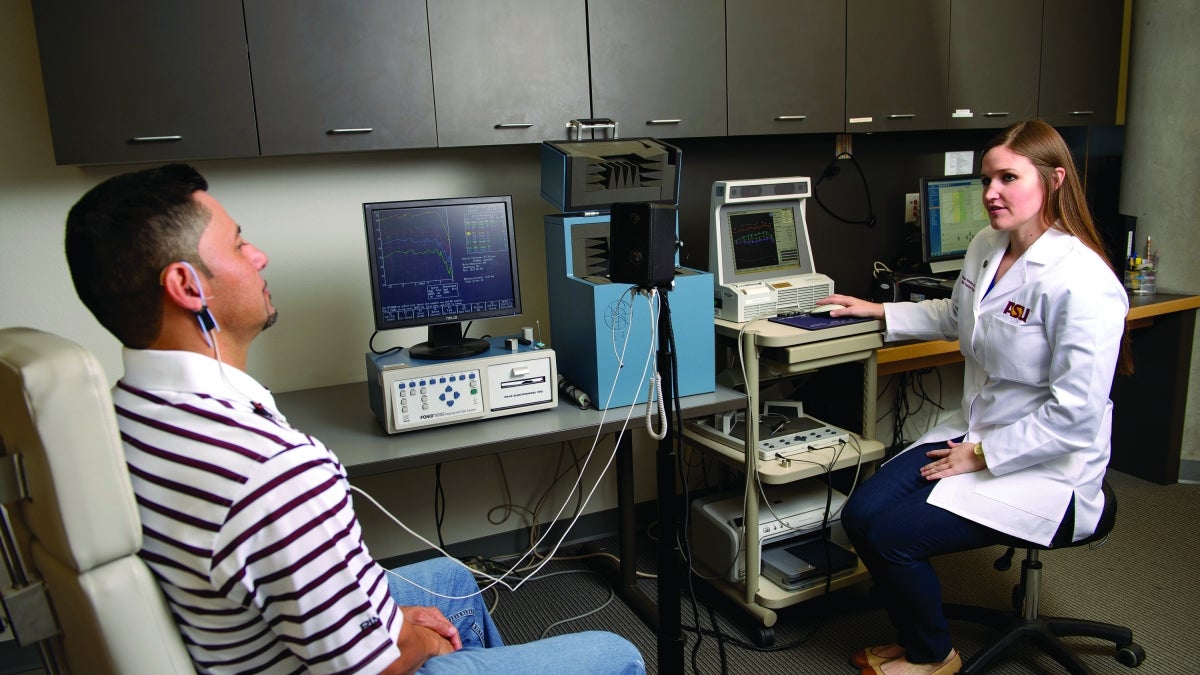You’re starting to emerge from the pandemic and gather with family again, and you notice that Mom seems a little withdrawn and sad. It could be a temporary change after having been socially isolated the past year, but it could be a symptom of a much more serious condition.
She might be having a very hard time hearing you.
Untreated hearing loss is a chronically underdiagnosed health concern that puts adults at a much higher risk for anxiety, depression and social isolation, according to a 2019 National Council on Aging study. Getting access to high-quality treatment can be difficult because hearing aids and follow-up services are expensive and rarely covered by health insurance.
To begin solving that problem in Arizona, the ASU Speech and Hearing Clinic at the College of Health Solutions teamed up with the Arizona Commission for the Deaf and the Hard of Hearing (ACDHH), the state’s leading hearing advocacy organization, to launch the Hearing Healthcare Assistance Project, a first-of-its-kind partnership to provide hearing aids and professional audiology care at no cost to low-income Arizonans who would otherwise not qualify for hearing services.
The two groups have been collaborating the past two years to identify gaps in Arizona’s hearing health care system. They found that while several organizations offer free or low-cost hearing aids, none offer comprehensive patient care and follow-up services. Their new program not only fits patients with free hearing aids, it also gives them a year of free care at the ASU Speech and Hearing Clinic for evaluation, assessment and rehabilitation. They formalized their partnership and their new model in May and plan to start accepting patients in June.
“A significant number of people need hearing health care but do not qualify for help through the state’s health care system and cannot afford private insurance. This collaboration with ASU bridges that gap to ensure Arizonans get the hearing health care they desperately need,” said Michele Michaels, ACDHH Hearing Healthcare Program manager.
And the need is great. Since 2017, the ACDHH has received more than 500 inquiries from people across Arizona asking for information on affordable hearing health care and hearing aids. These inquiries led to the start of a waiting list that continues to grow.
“The mission of the College of Health Solutions is to improve health outcomes and quality of life for the communities we serve. This program gives us the ability to help people who have not been able to receive hearing health care before,” said Deborah Helitzer, dean of the College of Health Solutions. “It aligns with our goal of expanding the services of our Speech and Hearing Clinic to make a real and lasting impact for populations with significant health disparities and needs.”
Finding a better way to fit adults in need with hearing aids and give them the rehabilitation and services that go along with the devices has been a dream for the ASU Speech and Hearing Clinic, said Kristin Samuelson, clinical assistant professor and director of the clinic’s audiology services.
“Every day at ASU we see patients who could benefit from hearing aids and rehabilitation services, but they can’t afford it," Samuelson said. "This collaboration with ACDHH will allow us to start the journey for many more and improve their quality of life because untreated hearing loss has been linked to social isolation, depression, reduced job performance, personal safety risks and even cognitive decline and dementia."
The clinic currently has about 100 brand-new hearing aids donated by Optium Hearing for patients identified for the program, but because the need is far greater than the number on hand, ASU is seeking sources of funding to purchase more new hearing aids.
“For the program to be successful, it must be sustainable. Our goal is to keep this program going for years to come,” Samuelson said.
Individuals interested in more information about the program or the application process should email Christy Abrams of the Arizona Commission for the Deaf and the Hard of Hearing at C.Abrams@acdhh.az.gov.
To support the ASU Speech and Hearing Clinic’s need to purchase more hearing aid devices, visit the clinic's homepage and click on the “Give” button.
Top photo: A clinician tests a patient's hearing at the College of Health Solutions' ASU Speech and Hearing Clinic on the Tempe campus. Photo courtesy College of Health Solutions
More Health and medicine
Is ‘U-shaped happiness’ universal?
A theory that’s been around for more than a decade describes a person’s subjective well-being — or “happiness” — as having a U-shape throughout the course of one’s life. If plotted on a graph, the…
College of Health Solutions medical nutrition student aims to give back to her Navajo community
As Miss Navajo Nation, Amy N. Begaye worked to improve lives in her community by raising awareness about STEM education and health and wellness.After her one-year term ended last month, Begaye’s…

Linguistics work could improve doctor-patient communications in Philippines, beyond
When Peter Torres traveled to Mapúa University in the Philippines over the summer, he was shocked to see a billboard promoting Arizona State University.“It wasn’t even near the university,” said…
